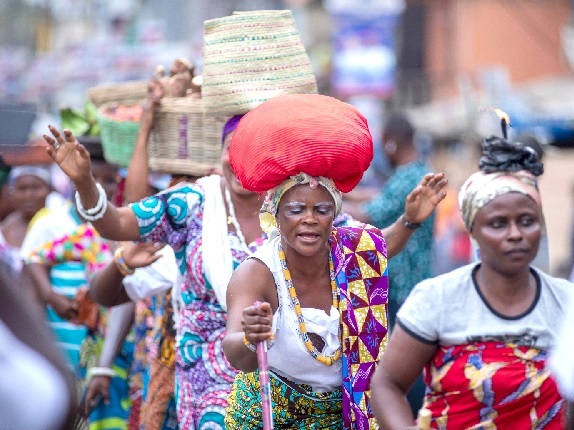I sat in silence for over 12 hours, thoroughly absorbed by the energetic and captivating performances of about 14 senior high school students.
Their displays were infused with innocence and sincerity, showcasing untapped talent within the creative arts sector.
The skills demonstrated by these young men and women were truly remarkable. It was the National High School Dance and Drama Championship, and the national theatre was filled with high school students, either there to support their peers or participate in the competition.
The drama groups from various schools addressed a wide array of themes, making commendable efforts to tackle contemporary social issues such as galamsey, political campaigns and elections.
Chieftaincy
However, a recurring theme in nearly all the performances was chieftaincy. While the students endeavoured to explore this theme, their interpretations often revealed a lack of understanding of the institution itself.
This resulted in a distorted portrayal of chieftaincy in Ghana and misconceptions about the roles of chiefs and councils of elders in the nation’s developmental agenda.
From extravagant costumes reminiscent of Nollywood films that lacked any authentic Ghanaian significance to the misuse of the 'Fiayi' of the Ewe people and the absence of 'Adinkra' symbols associated with the Akans, the young actors underscored a troubling reality: the older generation has either failed to impart our cultural values effectively or is struggling to do so.
In theatrical interpretations, the young actors often diverge from the traditional depiction of chieftaincy in Ghana, portraying chiefs as aggressive figures who shout and bark whilst in public.
This representation is inconsistent with the historical and cultural reality of chieftaincy, where chiefs typically maintain a demeanour of dignified silence, speaking only when necessary.
Such portrayals suggest a fundamental misunderstanding of the societal role and responsibilities of chiefs within Ghanaian culture.
Significance
The significance of our cultural heritage in safeguarding our values, history and identity as Ghanaians cannot be overstated.
This raises an important question: Are we effectively teaching GenZs in Ghana about their roots, identity and their role in the broader narrative of history?
In an age dominated by nanotechnology, it is understandable to question the relevance of chieftaincy and other cultural values in national development.
However, such inquiries may overlook the critical role that a people’s origin plays in shaping their development, including their traits, social structures and perspectives.
It appears that we are increasingly drawn to foreign cultures, as evidenced by our tastes in food and clothing. The consequences of this trend include rising unemployment and dwindling foreign exchange.
While the concept of globalisation is appealing, it is essential to recognise that even within a globalised framework, each country can and should preserve its unique cultural identity. Nations like India, China, Japan and South Africa arguably maintain their distinctive cultural legacies, securing their place on the world stage.
It can be argued that nations emerging from economic challenges begin by identifying their unique talents and resources.
They recognise how to effectively utilise these assets to develop solutions tailored to their specific needs. While we often admire the innovations of developed countries and find ourselves attempting to imitate or adopt their advancements at considerable expense, it is essential to return to the fundamentals.
We need to discern the unique values and strengths that set us apart. This process involves understanding our culture and specific circumstances.
Without a clear grasp of our identity, it becomes difficult to foster genuine improvement.
The urge to conform to what others are doing has always been prevalent. However, those who achieve success take the time to reflect on themselves, recognise their uniqueness and nurture it.
In Ghana, initiating the new direction we desire in our development could begin with teaching the next generation about their identity, capabilities and the resources at their disposal.
By doing so, they are likely to chart a different course for both Ghana and Africa.
The writer is a communication/media consultant.
E-mail: benonymullray@gmail.com

